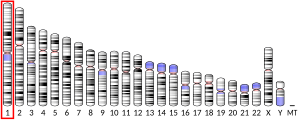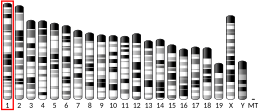JARID1B
Lysine-specific demethylase 5B also known as histone demethylase JARID1B is a demethylase enzyme that in humans is encoded by the KDM5B gene.[5][6][7] JARID1B belongs to the alpha-ketoglutarate-dependent hydroxylase superfamily.
Function
[edit]Jarid1B (also known as KDM5B or PLU1) is in the family of JHDM genes. These are responsible for demethylation of tri- and di-methylated lysines in the 4 position of histone 3 (H3K4me3 and H3K4me2). Jarid1B is a multidomain enzyme that is part of the subfamily KDM5. The whole Jarid1 family is a protein family that possesses H3K4 histone demethylase activity.[8]
Jarid1B has been implicated in the development of prostate, breast, and skin cancer and also has been associated with melanoma maintenance. Knockout mice (Jarid1b−/−) produced are viable in neonatal life. These mice do exhibit the phenotype of premature mortality, decreased fertility in female mice, reduction in body weight and impairment in mammary gland development. It also acted to decrease serum estrogen levels and caused reduced mammary epithelial cell proliferation in the early stages of puberty. These Jarid1b−/− mice seem to be greatly affected in many regulators of the development of mammy development such as FOXA1 and estrogen receptor α.[9] However, others have shown that a Jarid1B knockout embryos usually have neonatal lethality due to the failure of their respiratory system. Knockout embryos have also been seen to have several different neural defects including: disorganized cranial nerves, increased incidences of exencephaly, and defects in eye development.[10]
Interactions
[edit]JARID1B has been shown to interact with FOXG1[11] and PAX9.[11]
References
[edit]- ^ a b c GRCh38: Ensembl release 89: ENSG00000117139 – Ensembl, May 2017
- ^ a b c GRCm38: Ensembl release 89: ENSMUSG00000042207 – Ensembl, May 2017
- ^ "Human PubMed Reference:". National Center for Biotechnology Information, U.S. National Library of Medicine.
- ^ "Mouse PubMed Reference:". National Center for Biotechnology Information, U.S. National Library of Medicine.
- ^ Lahoud MH, Ristevski S, Venter DJ, Jermiin LS, Bertoncello I, Zavarsek S, Hasthorpe S, Drago J, de Kretser D, Hertzog PJ, Kola I (August 2001). "Gene targeting of Desrt, a novel ARID class DNA-binding protein, causes growth retardation and abnormal development of reproductive organs". Genome Research. 11 (8): 1327–34. doi:10.1101/gr.168801. hdl:10536/DRO/DU:30121320. PMID 11483573.
- ^ Zhu L, Hu J, Lin D, Whitson R, Itakura K, Chen Y (August 2001). "Dynamics of the Mrf-2 DNA-binding domain free and in complex with DNA". Biochemistry. 40 (31): 9142–50. doi:10.1021/bi010476a. PMID 11478881.
- ^ "Entrez Gene: JARID1B jumonji, AT rich interactive domain 1B".
- ^ Kristensen LH, Nielsen AL, Helgstrand C, Lees M, Cloos P, Kastrup JS, Helin K, Olsen L, Gajhede M (June 2012). "Studies of H3K4me3 demethylation by KDM5B/Jarid1B/PLU1 reveals strong substrate recognition in vitro and identifies 2,4-pyridine-dicarboxylic acid as an in vitro and in cell inhibitor". The FEBS Journal. 279 (11): 1905–14. doi:10.1111/j.1742-4658.2012.08567.x. PMID 22420752.
- ^ Zou MR, Cao J, Liu Z, Huh SJ, Polyak K, Yan Q (June 2014). "Histone demethylase jumonji AT-rich interactive domain 1B (JARID1B) controls mammary gland development by regulating key developmental and lineage specification genes". The Journal of Biological Chemistry. 289 (25): 17620–33. doi:10.1074/jbc.M114.570853. PMC 4067197. PMID 24802759.
- ^ Albert M, Schmitz SU, Kooistra SM, Malatesta M, Morales Torres C, Rekling JC, Johansen JV, Abarrategui I, Helin K (April 2013). "The histone demethylase Jarid1b ensures faithful mouse development by protecting developmental genes from aberrant H3K4me3". PLOS Genetics. 9 (4): e1003461. doi:10.1371/journal.pgen.1003461. PMC 3630093. PMID 23637629.
- ^ a b Tan K, Shaw AL, Madsen B, Jensen K, Taylor-Papadimitriou J, Freemont PS (June 2003). "Human PLU-1 Has transcriptional repression properties and interacts with the developmental transcription factors BF-1 and PAX9". The Journal of Biological Chemistry. 278 (23): 20507–13. doi:10.1074/jbc.M301994200. PMID 12657635.
Further reading
[edit]- Lu PJ, Sundquist K, Baeckstrom D, Poulsom R, Hanby A, Meier-Ewert S, Jones T, Mitchell M, Pitha-Rowe P, Freemont P, Taylor-Papadimitriou J (May 1999). "A novel gene (PLU-1) containing highly conserved putative DNA/chromatin binding motifs is specifically up-regulated in breast cancer". The Journal of Biological Chemistry. 274 (22): 15633–45. doi:10.1074/jbc.274.22.15633. PMID 10336460.
- Kashuba V, Protopopov A, Podowski R, Gizatullin R, Li J, Klein G, Wahlestedt C, Zabarovsky E (June 2000). "Isolation and chromosomal localization of a new human retinoblastoma binding protein 2 homologue 1a (RBBP2H1A)". European Journal of Human Genetics. 8 (6): 407–13. doi:10.1038/sj.ejhg.5200474. PMID 10878660.
- Barrett A, Madsen B, Copier J, Lu PJ, Cooper L, Scibetta AG, Burchell J, Taylor-Papadimitriou J (October 2002). "PLU-1 nuclear protein, which is upregulated in breast cancer, shows restricted expression in normal human adult tissues: a new cancer/testis antigen?". International Journal of Cancer. 101 (6): 581–8. doi:10.1002/ijc.10644. PMID 12237901.
- Tan K, Shaw AL, Madsen B, Jensen K, Taylor-Papadimitriou J, Freemont PS (June 2003). "Human PLU-1 Has transcriptional repression properties and interacts with the developmental transcription factors BF-1 and PAX9". The Journal of Biological Chemistry. 278 (23): 20507–13. doi:10.1074/jbc.M301994200. PMID 12657635.
- Patsialou A, Wilsker D, Moran E (2005). "DNA-binding properties of ARID family proteins". Nucleic Acids Research. 33 (1): 66–80. doi:10.1093/nar/gki145. PMC 546134. PMID 15640446.
- Tzschach A, Lenzner S, Moser B, Reinhardt R, Chelly J, Fryns JP, Kleefstra T, Raynaud M, Turner G, Ropers HH, Kuss A, Jensen LR (April 2006). "Novel JARID1C/SMCX mutations in patients with X-linked mental retardation". Human Mutation. 27 (4): 389. doi:10.1002/humu.9420. PMID 16541399.
- Yamane K, Tateishi K, Klose RJ, Fang J, Fabrizio LA, Erdjument-Bromage H, Taylor-Papadimitriou J, Tempst P, Zhang Y (March 2007). "PLU-1 is an H3K4 demethylase involved in transcriptional repression and breast cancer cell proliferation". Molecular Cell. 25 (6): 801–12. doi:10.1016/j.molcel.2007.03.001. PMID 17363312.
- Barrett A, Santangelo S, Tan K, Catchpole S, Roberts K, Spencer-Dene B, Hall D, Scibetta A, Burchell J, Verdin E, Freemont P, Taylor-Papadimitriou J (July 2007). "Breast cancer associated transcriptional repressor PLU-1/JARID1B interacts directly with histone deacetylases". International Journal of Cancer. 121 (2): 265–75. doi:10.1002/ijc.22673. PMID 17373667. S2CID 24855452.
External links
[edit]- JARID1B+protein,+human at the U.S. National Library of Medicine Medical Subject Headings (MeSH)
This article incorporates text from the United States National Library of Medicine, which is in the public domain.






